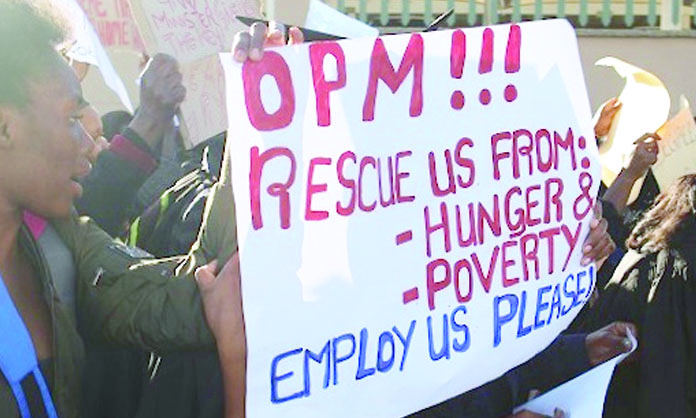The government says it is unable to offer a lifeline to the increasing number of teaching graduates facing unemployment after university.
Acting executive director of education, arts and culture Knox Imbuwa says the ministry simply does not have sufficient vacant posts to accommodate the majority of unemployed teacher graduates countrywide.
“While we sympathise with those who are yet to secure employment in the teaching service, the ministry regrettably cannot be obliged to recruit unemployed graduates beyond the capacity of its financial means and physical infrastructure,” Imbuwa says.
This comes as a blow to a group of more than 1 000 unemployed education graduates who have rallied together to petition the government.
The graduates say by imposing a moratorium on new admissions, the government could prevent further saturation of the job market and allow the teaching employment landscape to stabilise.
“This would provide ample opportunity for the current unemployment issue to resolve through a gradual increase in demand for teachers,” a petition of the group reads. Another proposal is the abolition of interviews for teaching posts.
Graduates say the current practice of multi-round interviews is a significant barrier to entry into the teaching profession.
Interviews are often held at distant towns or regions, accompanied by substantial preparatory work, they say.
Aina Amunyela (27), a graduate from the University of Namibia completed her studies in 2019, but has yet to secure a teaching post.
“I have never been able to put the course I studied for to use since completing my studies, despite my continuous job search efforts,” she says.
To make ends meet and afford transportation for interviews held in different locations, she has turned to running a small home-based business.
“It is a devastating situation,” Amunyela says.
Elizabeth Abisai, who specialised in junior primary English and Oshindonga at the International University of Management in 2020, echoes similar challenges in her job search.
Financial constraints have been preventing her from affording to apply for teaching positions, she says.
“The biggest challenge I encounter in my job search is money. I never have enough to pay for copies, courier services or transportation to interviews,” Abisai says.
Since graduating, she has been unable to secure a stable teaching job and has been forced to volunteer and substitute teach whenever opportunities arise.
Meanwhile, the education ministry maintains that its hands are tied.
Imbuwa says the lack of employment for teaching graduates stems from areas of specialisation, adding that a significant proportion of students are completing their education in fields of specialisation that are currently oversupplied in the job market.
He says the ministry has initiated discussions with institutions of higher learning, and urged them to give preference to admitting student teachers in disciplines that are less crowded.
These fields include subjects like Afrikaans first language, Setswana, Khoekhoegowab, chemistry, mathematics and physics.
“Following this advice, we should be able to address the issue of the oversupply of teachers in certain fields of studies, especially for the junior primary phase and languages, thus unbundling the graduate teachers’ unemployment backlog,” Imbuwa says.
He says a shortage of classrooms, leading to overcrowding, contributes significantly to the high unemployment rate among education graduates.
He says the ministry’s solution involves constructing more classrooms and complete schools to address enrollment challenges nationwide.
“However, this development has huge cost implications,” he says.
According to the ministry’s 15th Day School Report of 2023, there are about 31 970 teachers nationwide serving more than 864 700 pupils in 2 002 schools, both public and private, resulting in a national pupil-teacher ratio of 27 to 1.
However, around 23% of all schools have more than 50 pupils per teacher.
Additionally, for the current academic year an allocation of N$243 million was budgeted by the Ministry of Finance and Public Enterprises for the creation of 747 new teaching positions.
Stay informed with The Namibian – your source for credible journalism. Get in-depth reporting and opinions for
only N$85 a month. Invest in journalism, invest in democracy –
Subscribe Now!






